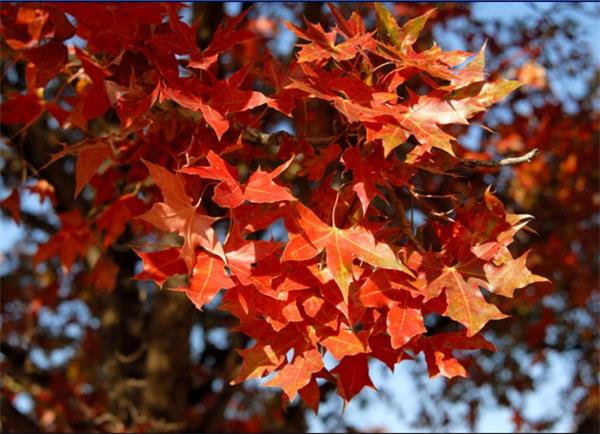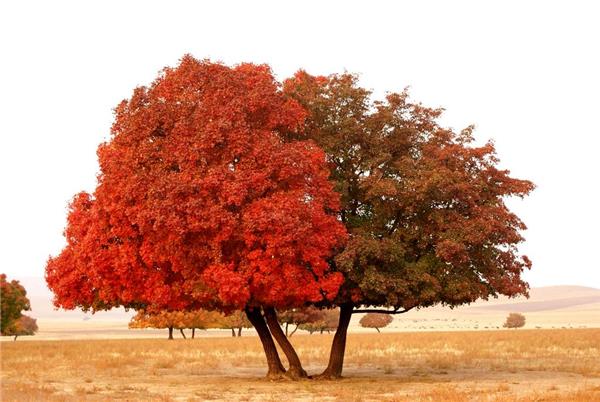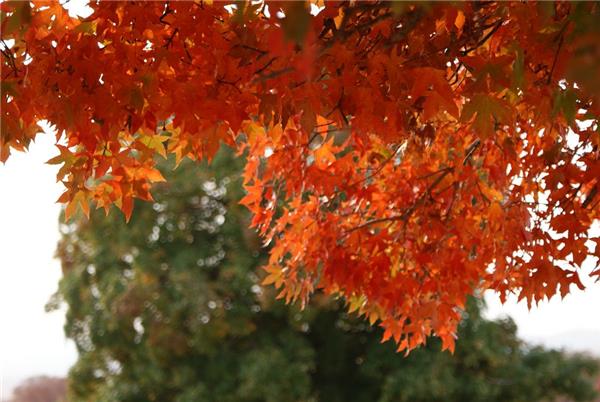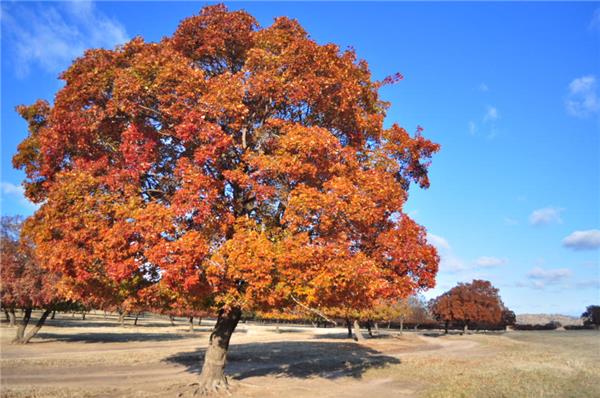Acer truncatum, a red and fiery afforestation tree species
Acer truncatum is a very suitable tree species for afforestation. When autumn comes, large tracts of orange maple will form an amazing beauty like a sea of fire. Even planting a single tree in the courtyard can increase the beauty of the courtyard.

Planting techniques of Acer truncatum
Seed collection: excellent mother plants with strong growth and no diseases and insect pests should be selected for seed collection. In October, the Samara changes from green to yellowish brown, that is, it is ripe and picked in time. The harvested Samara is exposed to the sun for 3-4 days, remove the impurity and knead the wings, and store them in the ventilated room after wind selection, or with wings. The most suitable moisture content of seeds during storage is 8% Murray 11%. The cotyledons of healthy and good seeds are fresh and yellowish green, such as discoloration, dryness or peculiar smell.
Soil preparation: it is suitable for sandy loam with gentle terrain, north wind to the sun, deep and loose soil layer and good drainage. Deep ploughing was carried out in autumn, raking flat and meticulous soil preparation to make beds before sowing, applying rotten soil fertilizer 1000-2000kg and phosphate fertilizer 25kg every 667m2, while spraying 1.5% dimethoate powder and 90% crystal trichlorfon to eliminate soil pests. The climate in the north of Henan province is relatively dry, and it is generally made of low bed.
Sowing: from late March to early April, the sowing rate is 15-20kg per 667m2, and the sowing rate will be increased appropriately when the seed quality or seedling conditions are poor. The thickness of soil cover is 2-3cm, and then the thickness of hay is 3-4cm. The covered grass will be removed after 4-5 days of seedling emergence.

Water and fertilizer: the number of irrigation during seed germination should be more and less; after the seedlings come out, the amount of irrigation should be more and less, once every 5-7 days, and each time should be irrigated thoroughly. Irrigation should be carried out in the morning and evening, and do not irrigate with heavy water at noon. The seedlings were treated with the proper combination of nitrogen, phosphorus and potassium, and the hardening period of seedlings was dominated by potash fertilizer, and nitrogen fertilizer was stopped. General topdressing for 3 to 4 times, using ditch application.
Weeding: generally carried out after the rain, the loosening of the soil in the row should be shallow than the thickness of the soil cover, and the depth between the rows can be appropriate. After most of the seedlings are unearthed, the grass cover should be removed in cloudy days or in the evening, and the management should be strengthened later.
Diseases and insect pests: the main diseases in the seedling stage of Acer truncatum are sudden arrival disease, brown spot and root rot. 0.1% uniconazole carbendazim can be sprayed 7-10 days after all the seedlings are unearthed to kill or inhibit a variety of soil pathogens. After the disease occurred, the seedlings were sprayed immediately with 1 ∶ 2 ∶ Bordeaux solution or methyl topiramate wettable powder 800-1000 times. Insect pests are mainly aphids, longicorn beetles and beetles, the former harms tender branches and leaves, while the latter is dry, which can be sprayed with 5000 times of 1% avermectin EC or 50% phoxim EC 1000-1500 times.

The method of pruning and shaping of Acer truncatum
1. After setting the stem, there are 2 layers of main branches, and 5-6 main branches are left in the whole tree, and then cut short, the first layer is about 50 meters, and the second layer is about 50 meters. In summer, remove the tillering buds below all the branching points. Three or four buds with suitable direction and uniform distribution were left on the main branch.
two。 In the second time, 2-3 buds were retained on each main branch to make it develop into branches. After the formation of a round crown, to maintain the crown height of the tree is more beautiful than 1:2. Break buds every year, cut off tillering branches, dry and withered branches, disease and insect branches, inner chamber thin and weak branches, erect long branches, and so on.
3. Acer truncatum pruning in winter and early spring is easy to suffer from wind and cold, and the cut wound does not stop, so it is best to prune at the beginning of growth at the end of March and the beginning of April, the wound is less, the wound is easy to heal, and does not affect the tree potential.
4. For the dominant terminal bud, which belongs to the main axis branching type, it is necessary to restrain the lateral branches and promote the main branches when pruning. For those with weak terminal bud dominance, withered or underdeveloped terminal bud, the top should be pruned, the lower side branch should be selected instead of the main branch, the strong buds closest to the main axis should be left under the cut, another pair of buds should be peeled off, and the branches issued later should be closest to the main axis, and the position and direction of the cutting buds in the next year should be opposite to those in the previous year, so as to ensure that the growth of the extended branches does not deviate from the main axis.

This is the end of the introduction of the five-pointed maple. I would like to remind everyone that we must be careful in the pruning of the five-pointed maple, and ensure that it cannot be missed or mistakenly cut, otherwise it will not enhance its beauty, but will make it uneven and lose its appreciation.
- Prev

[the propagation method of money tree] the division and insertion of money tree
[the propagation method of money tree] the division and insertion of money tree
- Next

The function of ryegrass and the methods of planting and maintenance
The function of ryegrass and the methods of planting and maintenance
Related
- Wuhan Hospital Iron Tree Blooming Result Was Instantly Frightened by the Gardener Master
- Which variety of camellia is the most fragrant and best? Which one do you like best?
- What is the small blue coat, the breeding methods and matters needing attention of the succulent plant
- Dormancy time and maintenance management of succulent plants during dormancy
- Minas succulent how to raise, Minas succulent plant pictures
- What are the varieties of winter succulent plants
- How to raise succulent plants in twelve rolls? let's take a look at some experience of breeding twelve rolls.
- Attention should be paid to water control for succulent plants during dormant period (winter and summer)
- Watering experience of twelve rolls of succulent plants
- Techniques for fertilizing succulent plants. An article will let you know how to fertilize succulent plants.

